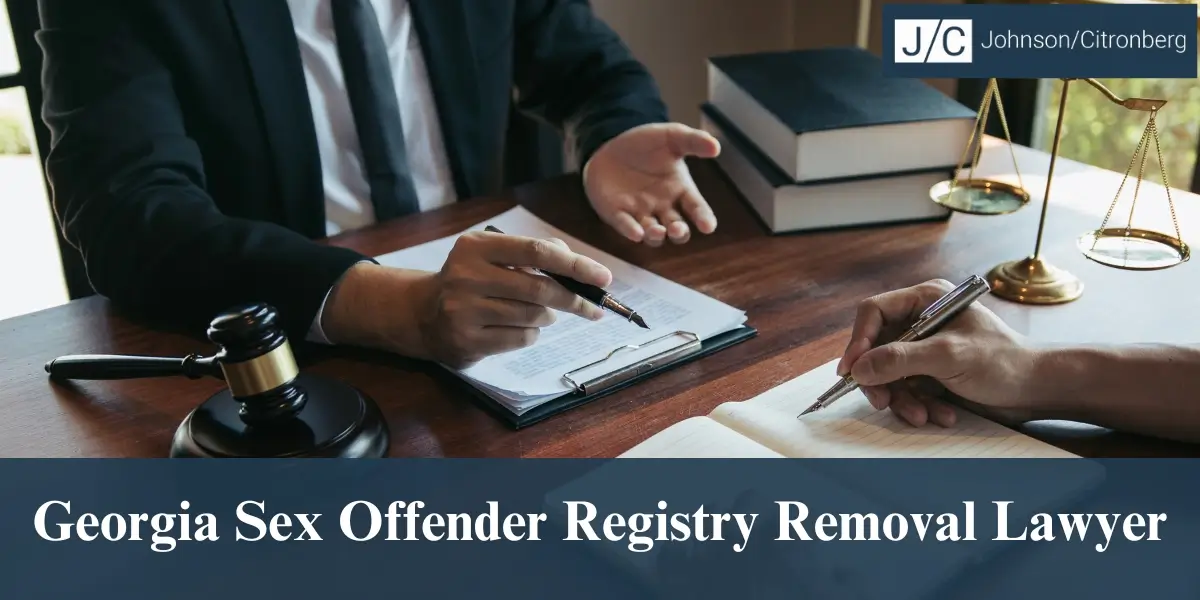Georgia Sex Offender Registry Removal Lawyer
Georgia law allows some individuals on the Georgia Sex Offender Registry to be removed from the registry. Below you will find the eligibility requirements and how the removal process works in Georgia. At Johnson/Citronberg, our experienced Georgia sex offender registry removal lawyer can guide you through this complex process, helping you understand your eligibility and the steps required to seek removal from the registry.
CONTACT JOHNSON/CITRONBERG (703) 684-8000
Georgia has roughly 24,000 people on the sex offender registry. The vast majority of these people are low-level offenders who have never and likely will never reoffend. For these people, Georgia provides a pathway to petition the court to come off the registry after a certain amount of time has passed. Our skilled criminal defense lawyer can assist you in navigating this process and work toward securing the removal of your name from the registry.

Georgia Sex Offender Registry
Georgia Code § 42-1-19 describes the removal process for Georgia’s sex offender registry. The person must first file a petition in the superior court of the county where they were convicted. If they were convicted out of state or in federal court, they must file the petition in their county of residence. The judge will then hold a hearing to determine whether or not they should be removed from the registry. This involves whether a person is likely to commit a sex offense in the future. If the judge determines that the person is eligible for removal, they will sign an order releasing them from all of Georgia’s sex offender registration requirements.
Eligibility Requirements
In order to file a petition, a person must have completed all prison, parole, supervised release, and probation for the offense that led to their registration. In addition, the following conditions must be met:
- No prior sex offense convictions.
- No weapons were involved (or objects that could cause serious bodily injury)
- No evidence of a similar transaction (i.e. accusation of a different sex offense, even if no arrest or conviction resulted)
- The victim did not suffer intentional physical harm
- The victim was not transported during the commission of the offense
- The victim was not physically restrained
In addition, you must have been classified by the board as a Level 1 risk assessment classification. Alternatively, if you have a Level 2 classification and ten years have passed since the completion of your sentence, you may be eligible to file a petition for removal. Anyone classified as a Level 3 (known as a Sexually Dangerous Predator) is ineligible to be removed. If you are facing challenges related to this process, Johnson/Citronberg’s experienced rape defense lawyer can provide expert legal counsel and assist in protecting your rights during this complex procedure.
Removal
After filing the petition to be removed, the judge will hold an evidentiary hearing, during which the defense attorney will present evidence that the person is eligible to be removed. The person must show that they are not likely to commit any future dangerous sexual offense by a preponderance of the evidence. Considered internet sex crimes can play a significant role in this evaluation, as the judge will take into account the nature of the original offense and the defendant’s conduct since their conviction.
While each case is different, there are a number of things that you can do to increase the odds of being removed:
- Psychosexual. By undergoing a psychosexual evaluation, you can provide the court with expert testimony that you are at a low risk of reoffending. This gives the judge a solid reason based on science as to why your removal makes sense in Georgia.
- Polygraph. A polygraph can show that you have not reoffended since you were convicted. While these are not always admissible, it can be powerful evidence when used properly.
- Character Witnesses. Character witnesses are typically family members, friends, employers, and neighbors. By coming to court, these individuals are essentially vouching for you that you will never reoffender and therefore should come off the registry.
- Showing Stability. The judge will want to see that you have a stable life. This can mean steady employment, a place to live, and family or community ties which suggest that you will not reoffend.
Contact Us
Johnson/Citronberg has an office in Atlanta, and we represent clients across Georgia. If you are looking for a compassionate, experienced, results-driven lawyer, give us a call at 855-959-4003.


